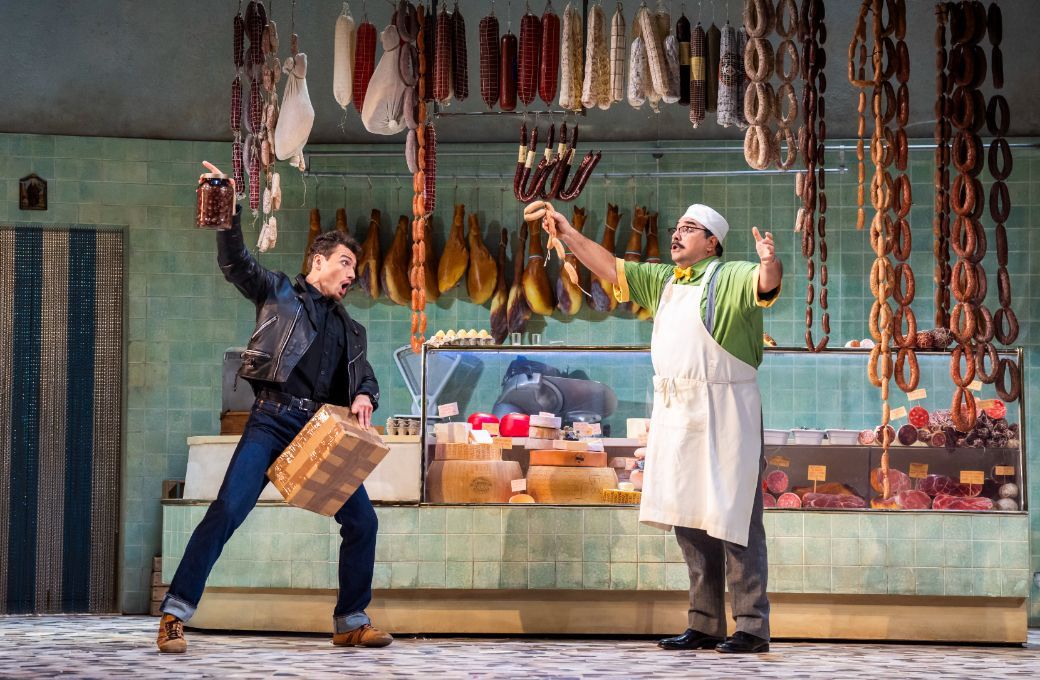Traditionally this time of year would have seen the commencement of the Glyndebourne Tour, but in the wake of the devastating cuts wrought by Arts Council England, those travelling performances have been grounded to the opera house in Lewes as a rebranded Autumn Season. It’s a shame that venues across England are being deprived of the opportunity to see the quality that Glyndebourne has brought to its comic offering of the season. Mariame Clément’s production of Il turco in Italia was a hit when it debuted in 2021 and its revival shows an acuity that hasn’t dulled in the intervening years.

Il turco doesn’t have the cachet of Il barbiere di Siviglia or Le Comte Ory, but has all the hallmarks that made Rossini great: endless melody, vocal fireworks and plenty of comedy. Clément’s staging captures the humour, turning the action into a lengthy dive into a writer’s processes, while also shading her interpretation with a 21st-century bleakness. The addition of a silent character – Prosdocimo’s current girlfriend who proofreads his work, massages his feet and generally acts as a supportive partner – gives the action an alternative audience and as Fiorilla sinks to despair, surrounded by former friends eager to condemn and decry her sexual liberty, she acts as a moral compass, focusing our attention on how repellant it is that a male writer has created this character to be humiliated for his own art (and profit). The silver lining comes when she herself becomes liberated from Prosdocimo and the opera ends with her fingers on a laptop, the surrounding characters in a tableau of upbeat anticipation at a different, brighter plot.
Deep philosophy out of the way, the gags in this production delight, whether it’s Prosdocimo’s hilariously high-minded scribblings projected onto a giant notepad in the centre of the stage in Act 1 or the absurdity of Geronio’s deli in Act 2, the site of a vegetable duel and an attempted suicide by sausage. Clément never misses a beat and under revival director Ian Rutherford the plot skips along with not a single dull moment. It helps that there’s some sensational chemistry on stage. Inna Demenkova’s Fiorilla and Michael Mofidian’s Selim exchange lustful glances and lingering looks with enough heat to roast a chicken; the audience is left in no doubt that these are figures of flesh, blood and sweat.
Demenkova provided the vocal sparks that made this revival so rewarding. There’s a surety to her higher register which allowed her coloratura to shine, the top notes rounded and reached without any sign, the legato smooth and the tone pearly. Demenkova’s is the sort of voice one longs to hear in this kind of repertory and any future Rossini performances will be worth the price of entry for her singing alone. Similarly, Mofidian deployed a bass that rippled with salted caramel notes; resonant and firm at the bottom and a glint to the top. Swaggering across the stage, he was unable to restrain a smile from twitching across his face at the sheer absurdity of much of the action; a compelling presence.
Fabio Capitanucci’s baritone was less vocally imposing, but as Geronio he brought buffo brilliance, a vision of blue-cardiganed ridiculousness. He showed excellent technique in the rapid-fire displays that Rossini gives to the role, the voice rarely losing power and projecting confidently over the orchestra. Agustín Gómez seemed to have a poor first night as Narciso; his small tenor sounded strained and tight, with uncomfortable high notes and a tendency to be drowned by the orchestra. Grace Durham brought sympathy to Zaida, her plangent mezzo full of colour and her sense of stillness an apt contrast to Demenkova’s livewire. Ross Ramgobin’s gentle baritone sometimes seemed a little occluded, but he provided the linchpin around which the action took place, bringing to life the vicissitudes of the successful novelist striving for his next big hit. A lively chorus delivered the big moments of Act 2 with comic energy, while in the pit Olivia Clarke led the orchestra in a reading that, if somewhat ropey at the beginning, relaxed into an effervescent accompaniment that comfortably suited the action on stage.


